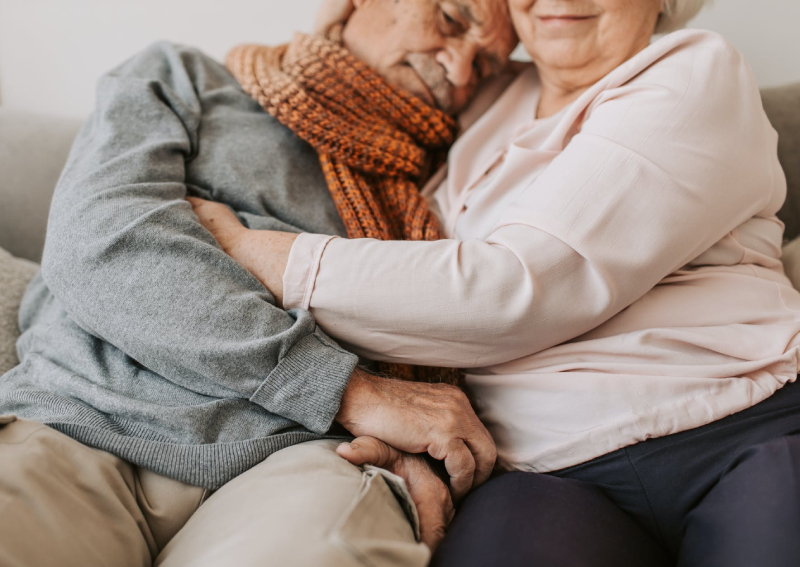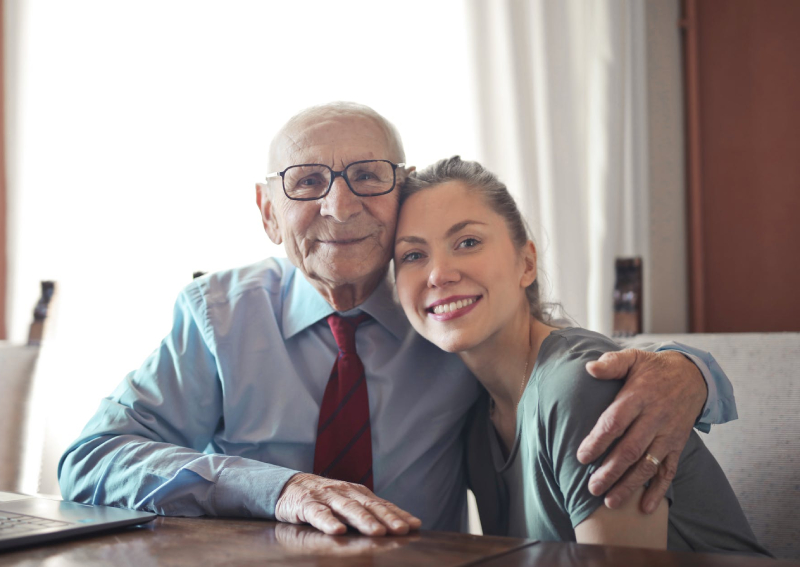Palliative care: Identifying end-of-life signs and how to prepare yourself emotionally


There will come a point of time in the lives of many older people where you cannot try to heal your condition any further. Instead, you will have to prepare for what comes next.
This preparation doesn't just include knowing how to cope physically and emotionally, but also how to make preparations for the rest of your family.
In this article we will talk about how to spot physical and emotional signs of end-of-life and how to prepare loved ones emotionally. We will also talk about how to make a lasting power of attorney to ensure that important decisions will be in order.

To know when you need to start preparing for end-of-life, you have to be able to recognise the physical and emotional signs that this time is coming. Here are some common physical signs of end-of-life:
Your loved one may become less active than they used to. This usually occurs around one to three months before someone passes on.
Your loved one may spend a lot more time sleeping than they used to as their body begins to prepare for the time when they will pass on. Do not try to wake them up unnecessarily.
As your loved one reaches the end-of-life, they may lose control of their bowel functions and start to urinate and defecate without knowing. Try to keep them clean and comfortable as much as you can.
Your loved one's skin might become cool to the touch as they near the end of their life. The colour of their skin might also change. You can keep them warm by placing warm damp towels on their hands and feet.
As people approach the end-of-life, their bodies will produce less urine as it conserves water. Consult the staff at the care facility your loved one is at or see a doctor if you are concerned about this change.
Similarly, older people may start to eat and drink less than before. This happens because the body is storing up nutrients to prepare for the end of life.

Emotional signs of end-of-life include:
Your loved one might feel anxious and restless, being unable to sleep. Sometimes they might make repetitive motions, like pulling at their clothing or their bedsheets. Speak to them gently and play soothing music to help them calm down.
Your loved one might not remember where they are or know the people around them. To help them, try to identify yourself before you speak and communicate information clearly and directly.
Your loved one may want to talk more about death when they sense the end-of-life approaching. Some of what they talk about can be unsettling, but try not to show your displeasure to them. Try not to stop them but instead listen to them calmly.
An unexplained sense of deep fear is a common emotional sign in people at the end-of-life stage. Reassure them and try your best to provide them with company if they ask for your support to feel less afraid.
As they look back on their life, your loved one may express guilt for certain things they did or failed to do in the past. Help them to resolve their feelings by talking about them and encourage them to look forward to what they can control in the present.
Your loved one may have less of a desire to talk with others for long and spend more time by themselves. Do not pressure them to talk to people if they don't want to, but at the same time remember to check in on them every so often to see how they are doing.
Your loved one might experience dreams or hallucinations related to death. When they talk about their experiences as if they were real, do not dismiss them.
Try to listen to them without judging them.

Caregivers are responsible not just for the physical needs but also emotional support of the people they care for.
Nonetheless, it can be difficult to support others emotionally if you are struggling yourself. Here is how you can cope emotionally and prepare yourself for the future.
Being emotionally overwhelmed by thoughts about death is normal and understandable. You don't have to pressure yourself into acting as if you are not affected by thinking about how your loved one's health is failing.
Accepting your emotions is one of the first steps to staying emotionally healthy in a crisis.
When the person you are caring for starts to experience failing health, you might feel as if the bad things happening are your fault. You might also feel angry at your inability to prevent your loved one's decline from happening.
Failing health is inevitable at the end-of-life stage, so don't beat yourself up over seeing your loved one's health get worse.
Focus your mental energies on staying positive and making the remaining time you have with them the best that you can.
Part of coping with end-of-life involves taking time out for yourself. Take a break if you feel you need to destress and process your emotions. If you have activities that you regularly do for leisure, you can use those to help you unwind and relax.
For example, you can take a walk in nature, exercise, draw or paint, play a musical instrument, or knit. Writing down your thoughts in a journal is also a good way of helping you let out and understand your emotions in your own private space.
As the proverb goes, "No man is an island." If you feel the burden of caregiving responsibilities is becoming too much to bear alone, don't be afraid to ask for support from others. You are not a failure if you cannot handle all the responsibilities of caregiving and daily life while coping with bad news.
In fact, trying to cope with everything on your own could lead to burnout and prevent you from providing a good quality of care.
Find a loved one to whom you can explain what is going on. If your friends and family understand your emotions and your circumstances, they will be more willing to lend a hand.

Coping emotionally with our own or our loved ones' deterioration is hard. It can be even more difficult to break the news and even talk about death to other family members and friends. Here are some general guidelines you can follow to talk to loved ones about death.
With the ease of mobile communication, we can be tempted to talk about important events digitally to save ourselves the "trouble" of meeting in person. Nonetheless, it is important to meet face-to-face to discuss issues as important as end-of-life.
It is easier to gauge emotions and to clarify important information when you are speaking in-person. If a family member is involved, gathering your relatives for a collective discussion would be a good way to help your loved ones feel involved and to gather their perspectives.
When it comes to something as serious as end-of-life, it is natural to expect a variety of reactions. Some of your loved ones might feel fearful for the future and what life would look like without you or your family member.
Others might have different perspectives over the next course of action to take, for example when it comes to what care options your loved one should receive. It is normal for people to be caught up in their emotions when there are sensitive matters to be discussed.
Before you step in to offer answers, hear your loved ones out. Knowing what their concerns are will help you to engage them better and prevent misunderstanding.
Bad news is always difficult to stomach. We might want to try to sugarcoat it, especially if we have to tell children. Even if you want to try to make the news less harsh, it should not be at the expense of telling the truth.
You might lose the trust of your family members if you omit details about what is really going on with yourself or your loved ones.
Lastly, give your family members time to grieve. Death is a difficult process to go through for anyone, especially if the person dying is someone close to you. Don't pressure your loved ones to carry on as if they are not affected at all.
Don't criticise them for being too sensitive. You can support them by offering to listen to them let out their feelings.

A lasting power of attorney (LPA) is a legal document that allows a person aged 21 and above to appoint someone else to officially make decisions on their behalf when that person loses their mental capacity.
The person making the LPA is known as the "donor" and the person appointed to make decisions is known as the "donee."
The donee also has to be at least 21 years old. You may choose to appoint more than one donee and determine if they should make decisions jointly, or if they can make decisions jointly and separately.
You can choose whether you allow your donee(s) to make decisions in matters of property, personal finances, or both.
Once you have decided on a donee, you need to find an issuer of the LPA certificate. Your certificate issuer has to be a medical doctor accredited by the Office of the Public Guardian, a registered psychiatrist or a practising lawyer.
You can find a directory of eligible issuers on the MSF website. Family members, business partners and employees, and staff of care facilities where the donor lives are generally not allowed to issue certificates of LPA.

Having an LPA is important to give you and your family peace of mind. There will be important matters related to finance and property which will have to be settled as you or your loved one nears the end of their life.
Without clear plans as you or your loved ones experience deteriorating mental capacity, there might be disagreements over money or property issues.
Choosing someone you trust to be your donee can give you the assurance that important affairs can be well taken care of even after you or your loved one has passed.
The first step you would have to take is to fill in a form indicating the donor and the donee. You can download this form from the MSF website . Once you have filled in the first LPA form indicating the donor and donee, you will have to see an LPA certificate issuer for them to ensure that the donor did not fill out the form under pressure.
After the certificate issuer has helped you complete your LPA application form, you can mail your documents to the Office of the Public Guardian. If there are no verified objections, the application will be approved within three weeks.
READ ALSO: What not to say to someone with dementia
This article was first published in homage.